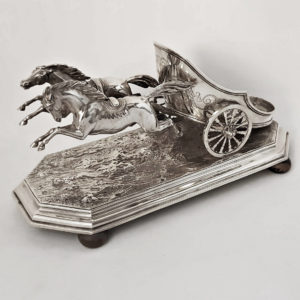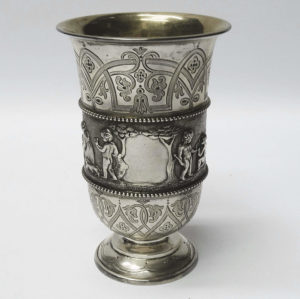George Angell
Originally a firm of manufacturing silversmiths, the Angell family business became one of the largest and most important silver and jewellery manufacturers and retailers in London in the mid 19th century. They participated in many major exhibitions worldwide and won many awards of excellence,
The founder, Joseph Angell, was apprenticed to Henry Nutting 1796, free 1804. First mark entered as plateworker 1811, second marks 1824. Third in partnership with his brother John Angell (apprenticed to William Elliott 1799, free 1807) in 1831. In circa 1837 Joseph’s son Joseph joined the business which became Angell, Son & Angell. In 1840 John Angell left and Joseph Angell senior and junior continued with a new mark (JA over JA). Joseph junior continued in his own name after his father’s retirement in 1848, participating in many major exhibitions and winning many awards of excellence, particularly for his enamel work. 1867-76 he was in partnership with John Browne after which he traded as Angell & Co.
John Angell’s son, John Charles Angell was apprenticed to his father 1825, free 1832. He entered his first mark together with his brother George in 1840.
George continued the business after John’s death in 1850 as George Angell & Co (1852-1860). George died in 1884 when the firm was taken over by Frederick Courthope who continued to trade under the same name until 1889.
George Angell
Originally a firm of manufacturing silversmiths, the Angell family business became one of the largest and most important silver and jewellery manufacturers and retailers in London in the mid 19th century. They participated in many major exhibitions worldwide and won many awards of excellence,
The founder, Joseph Angell, was apprenticed to Henry Nutting 1796, free 1804. First mark entered as plateworker 1811, second marks 1824. Third in partnership with his brother John Angell (apprenticed to William Elliott 1799, free 1807) in 1831. In circa 1837 Joseph’s son Joseph joined the business which became Angell, Son & Angell. In 1840 John Angell left and Joseph Angell senior and junior continued with a new mark (JA over JA). Joseph junior continued in his own name after his father’s retirement in 1848, participating in many major exhibitions and winning many awards of excellence, particularly for his enamel work. 1867-76 he was in partnership with John Browne after which he traded as Angell & Co.
John Angell’s son, John Charles Angell was apprenticed to his father 1825, free 1832. He entered his first mark together with his brother George in 1840.
George continued the business after John’s death in 1850 as George Angell & Co (1852-1860). George died in 1884 when the firm was taken over by Frederick Courthope who continued to trade under the same name until 1889.
-


1861
George Angell
8658 Antique Silver Model Chariot and Horses
£6,750
An outstanding piece of decorative silver. An antique sterling silver pair of galloping horses pulling a wheeled chariot. All mounted on a heavy solid silver base with naturalistic decoration, standing on four turned wooden feet. Excellent quality and good heavy weight. Weight 1506 grams, 48.4 troy ounces. Height 15.5cm. Base 33 x 16cm. London 1861. Maker George Angell.
-


1867
George Angell
8980 Antique Silver Beaker
Sold
An antique silver drinks cup. Fantastic quality with a charming applied border of cherubs. Finely engraved with arches, scrolls and flower motifs. Gilded interior. Contains 300 ml. Weight 208 grams, 6.6 troy ounces. Height 13 cms. Diameter 6.6 cms. All pieces marked. London 1867. Maker George Angell. Sterling silver